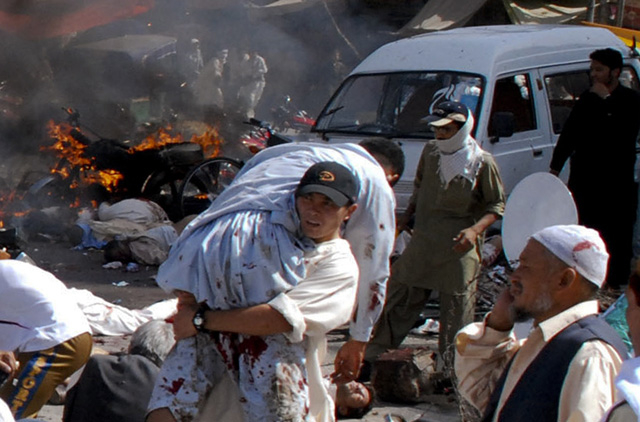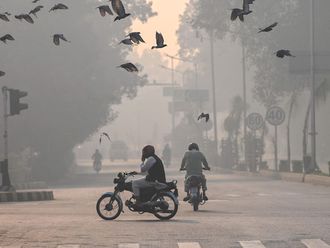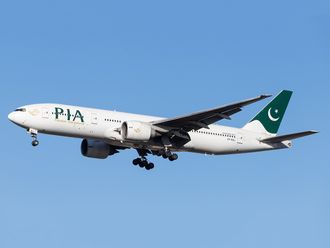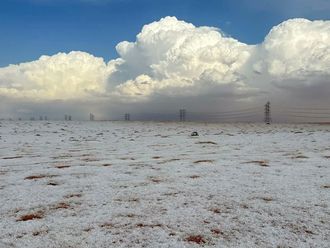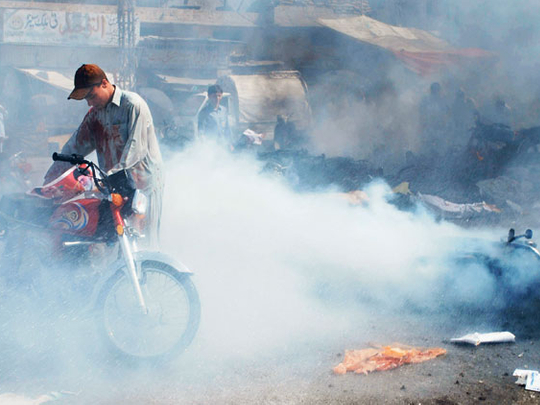
Quetta, Pakistan: Police say shopkeepers are observing a general strike and schools are shut for the day to mourn an overnight attack on minority Shiite Muslims that killed 65 people.
Police official Mohammad Sultan said on Saturday about 150 people were also wounded on Friday when a suicide bomber attacked Shiites who were rallying to express solidarity with Palestinians in the city of Quetta.
He said the death toll jumped overnight from 43 to 65.
Sultan said police were patrolling the city to ensure peace.
The attack in Quetta was the week's second claimed by the Pakistani Taliban and targeting Shiites, who are estimated to be about 20 percent of the population in the mostly Sunni Muslim country.
The attack on the Shi'ite rally expressing solidarity with the Palestinian people came as the United States said the devastating floods are likely to delay army offensives against Taliban insurgents.
"Unfortunately the flooding in Pakistan is probably going to delay any operations by the Pakistani army in North Waziristan for some period of time," US Defense Secretary Robert Gates said in Afghanistan where he is visiting US troops.
Scores were wounded in the Quetta attack, which like triple bombings at a Shi'ite procession in the city of Lahore this week, bore the hallmarks of the Taliban who often attack religious minorities to destablise the government.
"There are 24 dead in the Combined Military Hospital and the remaining are in two other hospitals," said a hospital official in Quetta, where dozens of dead and wounded lay in pools of blood after the blast that also engulfed vehicles in flames.
Earlier, the Al Qaeda-linked Taliban took responsibility for Wednesday's bombings in Lahore, further challenging the civilian government struggling to cope a month after devastating floods.
Aside from its battles against homegrown Taliban, Pakistan is under intense American pressure to tackle Afghan Taliban fighters who cross the border to attack US-led NATO troops.
Pakistan has said the army would decide when to carry out a full-fledged assault in North Waziristan, where Washington says anti-American militants enjoy safe havens, at the time it considers appropriate.
The Lahore blasts, which killed 33 people, were the first major attack since flood waters tore through the country. "It's revenge for the killings of innocent Sunnis," a spokesman for Qari Hussain Mehsud, mentor of the Taliban's suicide bombers, told Reuters by telephone from an undisclosed location.
In another attack on Friday in the northwest, a suicide bomber killed one person outside a mosque of the Ahmadi sect, who consider themselves Muslims but whom Pakistan has declared non-Muslims.
Attention has focused on the Pakistani Taliban again after US prosecutors this week charged its leader, Hakimullah Mehsud, in the plot that killed seven CIA employees at an American base in Afghanistan last December.
Islamist charities, some of them linked to militant groups, have at the same time joined in the relief effort for the millions affected by the worst floods in the nation's history.
US officials are concerned that the involvement of hardline groups in flood relief will undermine the fight against militancy in Pakistan as well Afghanistan.
ECONOMIC CRISIS
Anger is spreading over the government's sluggish response to the floods, raising the possibility of social unrest.
"The scope and scale of this discontent will depend on the government's performance in preventing a second wave of deaths, loss of livelihood, and shortages of essential food items," said Eurasia consultancy group.
Pakistan is also faced with an economic catastrophe, with the floods causing damage the government has estimated at $43 billion, almost one quarter of the South Asian nation's 2009 GDP.
Some relief has come from the International Monetary Fund (IMF). It will give Pakistan $450 million in emergency flood aid and disburse funds in September to help the country's economy cope with the devastation of the floods.


